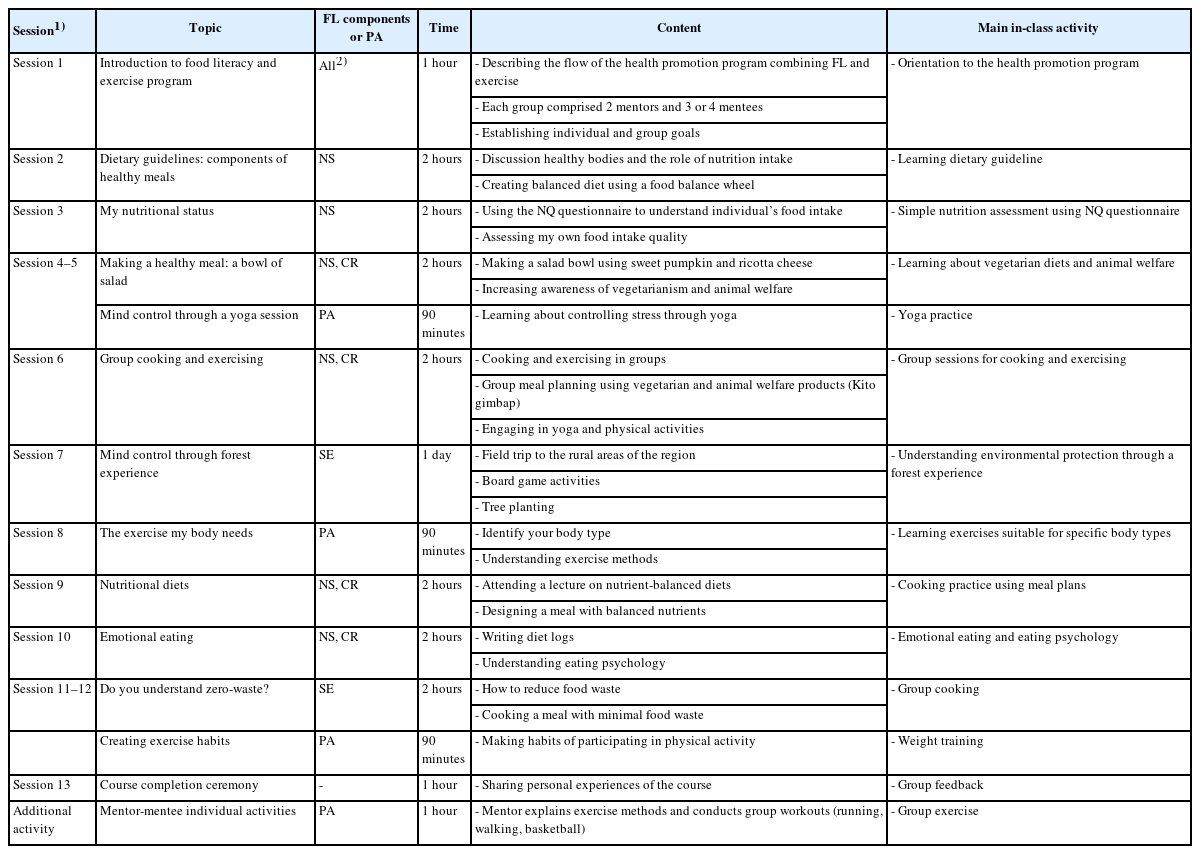Search
- Page Path
- HOME > Search
Research Note
- [English]
- A pilot investigation of a combined food literacy and exercise program for college students: a one-group pre-post intervention study
- Minjeong Jeong, Jinhyun Kim, Dahye Han, Eunjin Jang, Kyoungho Choi, Sohyun Park
- Korean J Community Nutr 2024;29(6):455-466. Published online December 31, 2024
- DOI: https://doi.org/10.5720/kjcn.2024.00248

-
 Abstract
Abstract
 PDF
PDF - Objectives
A campus-based intervention to enhance food literacy (FL) and establish exercise habits among college students was developed and the program’s effectiveness was evaluated.
Methods
The 13-session program was developed based on the transtheoretical model and social cognitive theory. Junior and senior students majoring in food and nutrition and physical education were asked to participate as mentors, with freshmen and sophomores from varied majors as mentees. The program encompassed food, nutrition, and exercise lessons including cooking sessions. Data were collected via pre- and post-program surveys using a questionnaire consisting of items on FL and nutrition behaviors and physical fitness measurements.
Results
Among 39 participants (35.9% male, 64.1% female), the overall FL score increased significantly from 64.1 to 70.6 post-program (P = 0.001). Significant increases were observed in the nutrition and safety (P < 0.001), cultural and relational (P = 0.023), and socio-ecological (P = 0.001) domains, as well as knowledge (P = 0.001), self-efficacy (P = 0.013), attitude (P < 0.001), and behavior (P = 0.005) items in three domains of FL. Additionally, meal duration increased significantly (P = 0.007) and sit-up performance among female showed a meaningful change (P = 0.046). Changes in dietary behaviors significantly progressed (P = 0.015) while that in exercise habits approached a marginal significance (P = 0.053) after the intervention.
Conclusion
The results reveal positive changes in FL and some modifications in eating habits, although the program had limited effects on physical activity and fitness measurements. These findings suggest that strategic approaches to foster exercise behavior changes in college students are required. This pilot program can serve as foundational data for improving and expanding multicomponent health promotion programs for this population. -
Citations
Citations to this article as recorded by- The Dragon Fruit Advantage: Exploring University Students’ Experiences and Perceptions of a Targeted Nutrition Education Module
Adelfa Silor, Faith Stephanny C. Silor
Seminars in Medical Writing and Education.2025; 4: 924. CrossRef
- The Dragon Fruit Advantage: Exploring University Students’ Experiences and Perceptions of a Targeted Nutrition Education Module
- 2,543 View
- 55 Download
- 1 Crossref


 KSCN
KSCN

 First
First Prev
Prev



